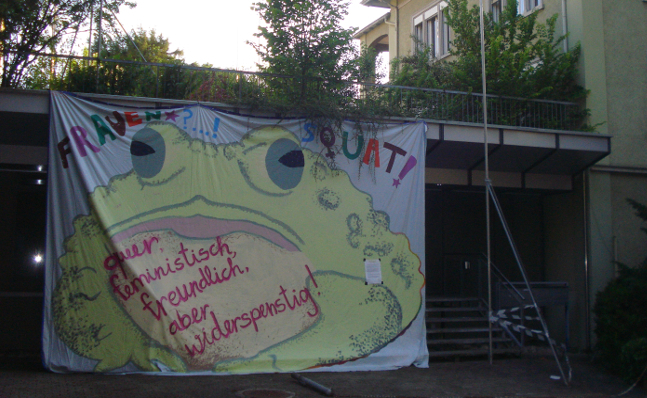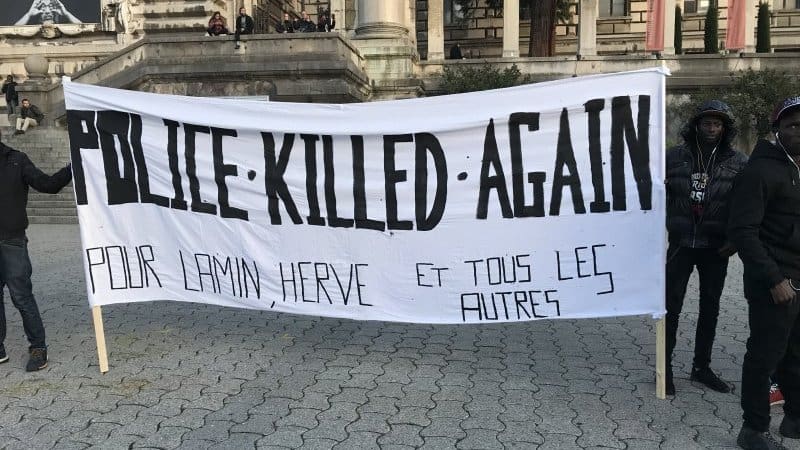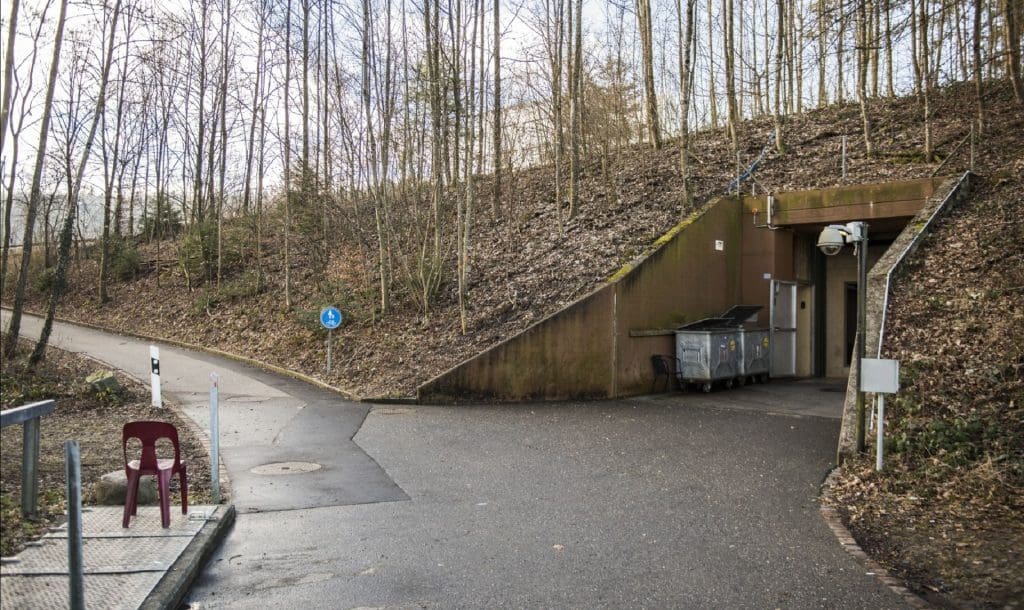AntiNote: By translating the following two communiqués we would like to call attention to and declare our solidarity with a new squat in Zurich, the circumstances around which are—to say the least—somewhat special. We will let the Kröte Family, as the squatters call themselves, explain most of this themselves. But since most of our readers live outside of Zurich, we hasten to add that the neighborhood in District 7 of the city where the squat was established, posh as it has become, has barely been touched by the autonomous movement in the nearly forty years since it was an old bohemian epicenter of the 1980 youth uprising. Here’s to being toads in the punchbowl! Much love!
Communiqué from the Zurich Women*’s Squat
by the Kröte Family, for the new Swiss anti-authoritarian news portal Barrikade
26 May 2017 (original post in German)
On Tuesday morning, 9 May 2017, we moved into the building at Freiestrasse 134 in Zurich. We are a group of women* of varying backgrounds – what unites us is the idea of a self-organized women*’s house. We would like to establish a vibrant and colorful place where we can realize queer-feminist projects and have a good time together. Central for us is the attempt to distance ourselves from learned patriarchal structures. It is important for us to create a counterculture animated by women*. This happens so rarely in a world dominated by men, and when it does, it gets discredited, ridiculed, or labeled a self-help group. We’re not here just for fun; this is not a joke project! Though it does feel good to pose a challenge.
The real estate company Interpool AG, the owner of this property, wants to kick us out of our new home by Monday, May 29. They claim there is a plan for interim use of the building. This despite the fact that we entered negotiations with them and submitted a proposal for maintaining “orderly conditions” according to their wishes, in the form of a lend-use contract. We are disappointed and angry.
For it is clear: if we weren’t here, the building would be standing empty. “Interim use” programs [Zwischennutzungen] often merely serve the purpose of preventing squatting and avoiding the appearance that a building is being left to waste away. The whole business of interim use, exemplified by the company Interim AG, stems not out of goodwill for poor students but the desire to extract profit from an ostensible social service. People who participate in quasi-legitimate interim use programs in vacant properties have no tenants’ rights. But for real estate sharks like Interpool AG, the specious “good reputation” of interim use programs comes in handy. In an email to us, they presented themselves as the do-gooders, as the following quote demonstrates: “Students rely on affordable housing being available within reasonable distance of the university.”
In the last two weeks we have had numerous encounters with kind residents around the neighborhood. Many show enthusiasm for our initiative, and support our demand for self-organized women*’s spaces. They do not agree with Interpool AG’s plans for development or the mission statement that can be found on their homepage: “We hold residential and commercial real estate and hotels that generate stable yearly revenue, as well as attractive development tracts. Location, ecology, and quality are our top priorities in new construction.” This declaration is as flimsy as the company’s claims around interim use. The demolition of well-preserved buildings and their replacement with overpriced and ugly new complexes according to the maxims of financial speculation and profit growth ultimately degrades cities, turning them into machines of order and function which leave no room for low-income residents, creativity, or self-organization.
With the unauthorized appropriation and occupation of vacant housing stock, we call private property as such into question. We want to live out and prefigure self-organized, feminist alternatives to capitalist city planning. For this reason, we will keep fighting.
Show your solidarity with our project by stopping by, or write an email to Interpool AG with your opinion [direct contact information available in the German original. —ed.].
Queer-feminist—friendly and unruly!
The Kröte Family
First Monthiversary of the Freiestrasse Squat – Quack!
by the Kröte Family for Barrikade
11 June 2017 (original post in German)
A month ago, the building at Freiestrasse 134 was occupied. Four turbulent weeks in the new women*’s squat: a progress report from the Kröte Family
The owner, Interpool Investment AG—specifically Yves and Raffael Meili—have closed on a contract with the interim use company Intermezzo; this entails finding “legitimate” interim users and creates, therefore, grounds for our eviction. Nevertheless, our image of the Meili brothers, which over the last three weeks has been dragged through the toadslime [a play on the squatters’ family name; Kröte = toad. —ed.] by way of our contact with the neighborhood, the media, and many solidary activist groups, warrants a washing.
The Meilis changed their strategy and offered us the neighboring building, Freiestrasse 138, along with its large annex, a former convention hall. Apparently there is no interest in an interim use for these properties; the effort and expense would be greater, it seems, as the plumbing needs to be redone. The building has been standing vacant for over a year and a half.
The Meilis have accepted our demands; we have founded an association and signed a lend-use contract with them. We can stay until construction of the new development begins; when that will be is uncertain.
Bravo! We finally have a place to live as well as a space for events, meetings, and queer-feminist projects. Just what we wanted.
Okay, maybe we should rewind a bit…
Why do we squat?
City planning is political and is guided by various interests—increasingly those of the real estate sector. Properties get bought up, torn down, and pimped out. Rents increase, people are driven to the edge of (or out of) town. Admittedly, this is less of an issue here in Zurich-Hottingen. The people who move away from here can probably still afford a nice place somewhere else in the city. But displacement has many faces,i and viewed in a broader context it’s always the same model: the few decide for the many, and extract greater profits. Rents keep going up.
This fact is one of many mosaic tiles constituting our system which is built on hierarchies, exploitation, greed, and moral vacuity. Capitalism, neoliberalism, whatever term we use for the whole damn shitshow—we know what it’s about and where the problems lie.
Zurich needs a Women*’s Squat!
From the first days of the occupation it has been clear that this is about women*. We consciously decided to communicate this to the outside. Why women* have decided to occupy and reside in a building without cis men can be explained elsewhere; the question at hand is why such a space is both necessary and sensible.
The reactions to our squat that we have observed thus far are good examples of the everyday sexism our society is shot through with: the Meilis found it amusing, for example, that the building was squatted by women*. Aren’t they supposed to be afraid of radical groups? None of this is worth further comment, really; it’s rather boring.
But then there are our neighbors, who have mostly shown support and encouragement: “What you’re doing here is super! Keep it up!” One reason for this posture is surely the fact that we are women*, i.e. that we are ascribed with “typically female” attributes—communication and social skills, calm, reserve.
Here we should emphasize that we consciously sought to establish a cooperative approach to communication with the owners and our neighbors for strategic reasons. There have been many friendly encounters with people from the neighborhood who rightly recognize our project as a challenge to the whole aforementioned shitshow. This, of course, excites and motivates us further.
Nevertheless, our friendliness has nothing to do with our being women*. It should be clear that we were also kicking around other ideas, and the occupation could have gone down differently. Some of us, had it become clear that we would have to leave Freiestrasse 134, would have gladly barricaded ourselves inside and readied ourselves to fight the Meili brothers and the police.
So we’ve made an extra-special effort to put a good face on it. We have explained, spoken, conversed, and explained some more, even when we weren’t in the mood or didn’t have time, or when certain issues internal to the group seemed more urgent. We wrote texts, distributed them, made phonecalls, cooked, argued. Even the owners and the police were convinced, ultimately, that we’re nice, harmless people. And nobody would dispute that their interests and ours have virtually zero overlap.
It is interesting to see, therefore, how easily the images and commentaries around leftists and radicals created by the media can be ignored by the general public or replaced with other images and commentaries, depending on what one wants at a particular moment.
Because squatting—to put aside for now the political and personal motivations for it—means, concretely, that people stake out a building, determine if it’s vacant, and then one night they set upon it. Perhaps a window gets broken or a door’s locks busted. If it then comes to a confrontation with police or owners, the same arguments and accusations dutifully appear—often revolving around the concept of private property. “If you had asked first, it might have turned out differently for you. But it doesn’t work this way. I don’t just take something that doesn’t belong to me.”
What private property is (socially, economically, and politically) and whether it means the same thing when buildings belong to giant profit-hungry real estate companies—this is also beyond the scope of this writing. But it is in any case a kind of resistance to the system to take a building without asking; this alone calls private property as such into question.
Squatting or Interim Use?
Of course it is a funny feeling when an investment company suddenly opens the front door of a building for us and shows us around, and then we freely vacate a new squat for the apparent sake of some students (who will be paying Intermezzo almost seven thousand francs per month to stay in the building at Freiestrasse 134).
Intermezzo, Interim, Novac Solutions: surely there will soon be even more of these agencies, for whom the negotiation of interim use programs seems to be a very lucrative business requiring very little effort. So-called innovative young entrepreneurs only have to find a vacant building, convince its owner that it’s not a good idea to leave it unattended, and then find a couple undiscerning people to live there. Voilà.
That these students allow themselves to be exploited—they are paying extremely high rent without any tenants’ rights—and have simultaneously (even if unintentionally and indirectly) chased off a squat, and that they won’t consider dropping the deal or even at least releasing a statement, is difficult for us to understand. It will make for an interesting neighbor situation.
This women*’s squat begins, therefore, with a few contradictions. Of course we are glad, after these four weeks, to have a place to live. But we have had other thoughts. So far, the toad pictured on the banner hanging in front of the building has stayed friendly, and looks forward to the many queer-feminist, anti-authoritarian, and anti-capitalist projects that will take place here. Still, we pledge to remain unruly.
Translated by Antidote
Featured image source: Barrikade
***
i Displacement Has Many Faces, or Verdrängung hat viele Gesichter, is the title of a 2014 DIY documentary film about gentrification in Berlin. Trailer / website





